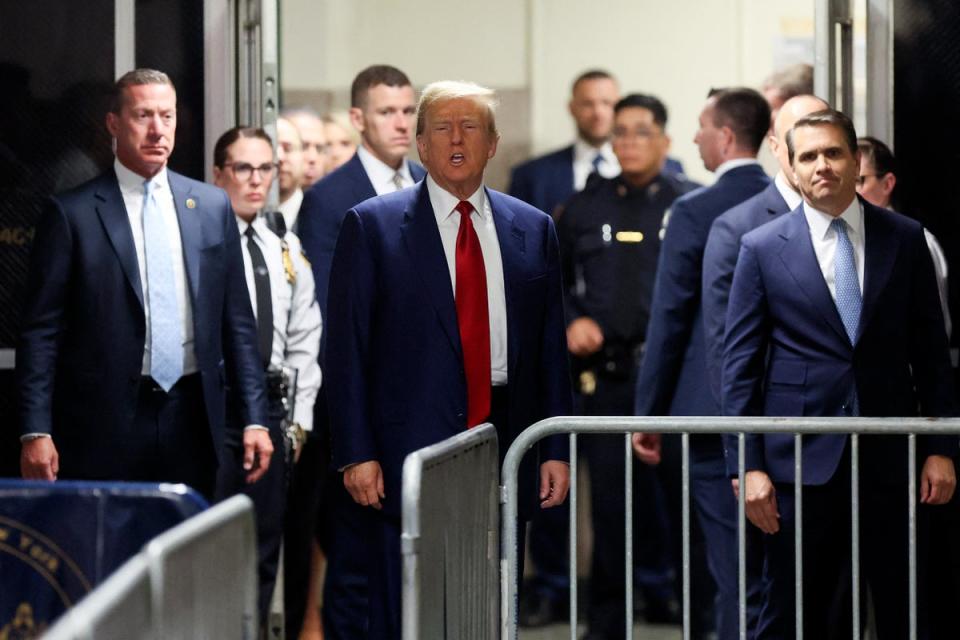Trump hush money judge scolds ex-president’s attorneys for delay tactics: ‘It’s odd we’re even here’
Attorneys for Donald Trump failed to convince a judge that the Manhattan District Attorney’s Office mishandled potential evidence in his criminal case stemming from an alleged hush money scheme to bury embarrassing stories of his affairs.
The former president arrived inside a 15th floor criminal courtroom in Manhattan on Monday morning for yet another pretrial hearing in the case, what was supposed to be the first day of jury selection for the first-ever criminal trial against a president.
Instead, New York Justice Juan Merchan presided over a hearing where Mr Trump’s attorneys levelled allegations of misconduct against Manhattan District Attorney Alvin Bragg’s office over the production of thousands of pages of documents surrounding Michael Cohen, Mr Trump’s former attorney and a key witness in the case.
The judge grew increasingly frustrated with the former president’s legal team, saying at one point that he found it “odd that we’re even here”.
“What I’m seeing is, to me, what has become a pattern,” the judge told Mr Trump’s attorney Todd Blanche before a morning break.
“I hear certain information, I see certain information … Your interpretation of that is really different from my interpretation,” he added. “It’s frankly been going on for months. You just heard one set of facts and interpreted that as the People not doing anything … it’s really… it’s odd that we’re even here.”
The judge ultimately rejected the accusations and set a new trial date for 15 April.
Judge Merchan determined that the district attorney was not at fault for the late production of documents, that the office has “complied and continues to comply” with its discovery obligations and has made “diligent, good faith efforts” for discovery production.
“This court finds the defendant will not suffer any prejudice because the defendant has had reasonable time to prepare” for trial,” he added.
Earlier, the judge scolded Mr Blanche for apparently failing to cite any prior cases to explain how, exactly, the district attorney’s office failed its discovery obligations under state law.
“If you don’t have a case right now it is really disconcerting,” he said. “The allegation that the defence makes in all of your papers about the People’s misconduct is incredibly serious. Unbelievably serious. You are literally accusing the Manhattan DA’s office and the people prosecuting this case, and trying to make me complicit in it. And you don’t have a single cite to support that position?”

Jury selection was initially set to begin on 25 March, but Judge Merchan agreed to delay the proceedings after attorneys for both parties wanted to review thousands of documents from federal prosecutors and the US Attorney’s Office.
The judge agreed to hold a hearing to get to the bottom of “who, if anyone” is responsible for delays in that document production, and “what sanctions if any are appropriate”.
Earlier this month, DA Bragg said the agency had produced thousands of pages of records related to a separate but parallel federal investigation into Cohen, who pleaded guilty in 2018 to federal campaign finance charges stemming from the alleged scheme. Among the charges, Cohen pleaded guilty to making payments to women who allegedly had affairs with Mr Trump.
Mr Bragg’s office had urged the judge against further delaying the start of a trial, after finding that fewer than 300 of 170,000 documents recently provided by federal prosecutors were relevant to Mr Trump’s defence.
Mr Bragg’s office also called Mr Trump’s focus on the documents a “red herring” and another delay tactic.
Last year, in the first criminal indictment against him, a grand jury charged the former president with 34 counts of falsifying business records in connection with repayments to his then-lawyer, who arranged a hush-money scheme to prevent the release of potentially compromising stories about Mr Trump and his alleged affairs.
Prosecutors are expected to rely on Cohen’s testimony that Mr Trump authorised his business to falsely file payments as legal expenses, according to prosecutors.
“We’re not doing our jobs if we’re not independently looking at new material,” Mr Blanche told the court on Monday.
When repeatedly asked by the judge for the number of new documents deemed important to their case, Mr Blanche responded: “Tens of thousands.”
“I just want to be accurate. And the reality is every document is important,” he added. “We still have to have a process in place to look at the bank records, to look at the internal correspondence.”


